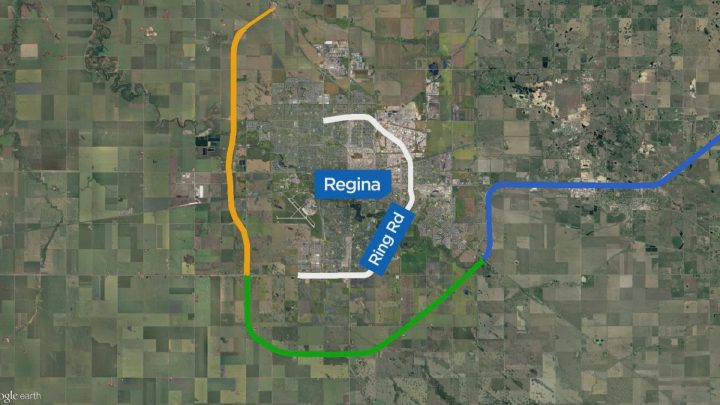The provincial government says the Regina bypass is on budget and should be open on schedule this October.

Construction is 95 per cent complete. Remaining work includes final paving with about 200,000 tonnes of asphalt left to go down. Finishing touches left to complete the project include line painting, and sign, light, guardrail and curb installation.
“I think a lot of the major risks are behind us now and it’s looking really positive going forward,” said Regina Bypass director Brent Miller. “When you’re in the earlier stages of the project with grading and earthworks it takes a lot longer to dry the material and get going again after inclement weather.”
The $1.88 billion dollar Regina bypass project is the single biggest infrastructure project in the province’s history. When complete, it will include 65 kilometers of a four-lane (twin) highway.
The first phase of the project from Highway 1 to Arcola Avenue was opened in 2017. The second and final phase will see that extended from Arcola around the south and west sides of the city to Highway 11 in the north.
Miller says that once complete, one of the biggest benefits of the bypass will be improved traffic safety.

Get daily National news
“On the Highway 1 east corridor in the past, we’ve had a lot of injuries and deaths. I’m happy to report since we’ve opened that phase of the project there have not been any serious injuries or fatalities on that stretch of the highway,” Miller said. “That’s really satisfying to know this job has saved lives.”
The Bypass will also help ease traffic congestion, particularly along Victoria Avenue where semi trucks have to battle traffic lights as they make their way to the Ring Road.
“The semis will really benefit. Instead of having to do a lot of stopping and going on Victoria Avenue they can travel at full speed at 110 km/h and get to their destination more efficiently and safely,” Miller said.
The province touted several other benefits of the bypass in a media release Thursday, including that construction created 9,200 jobs in Saskatchewan. They also project a reduction of more than 160 million litres in fuel consumption due to better traffic flow and around $2.3 billion in travel delay savings over 30 years.
Discussion about a bypass between the City of Regina and the province first began in the 1990s. Construction began in 2015. The project’s $1.88 billion dollar price tag includes the costs of 30 years of maintenance and operation.
- US forces stop 2nd oil tanker off Venezuela coast as Trump follows promise to seize tankers
- Flu hospitalizations rise sharply as H3N2 spreads across Canada
- Tax season is still months away. Doing 3 things now could help you later
- Paraplegic engineer becomes the first wheelchair user to blast into space








Comments